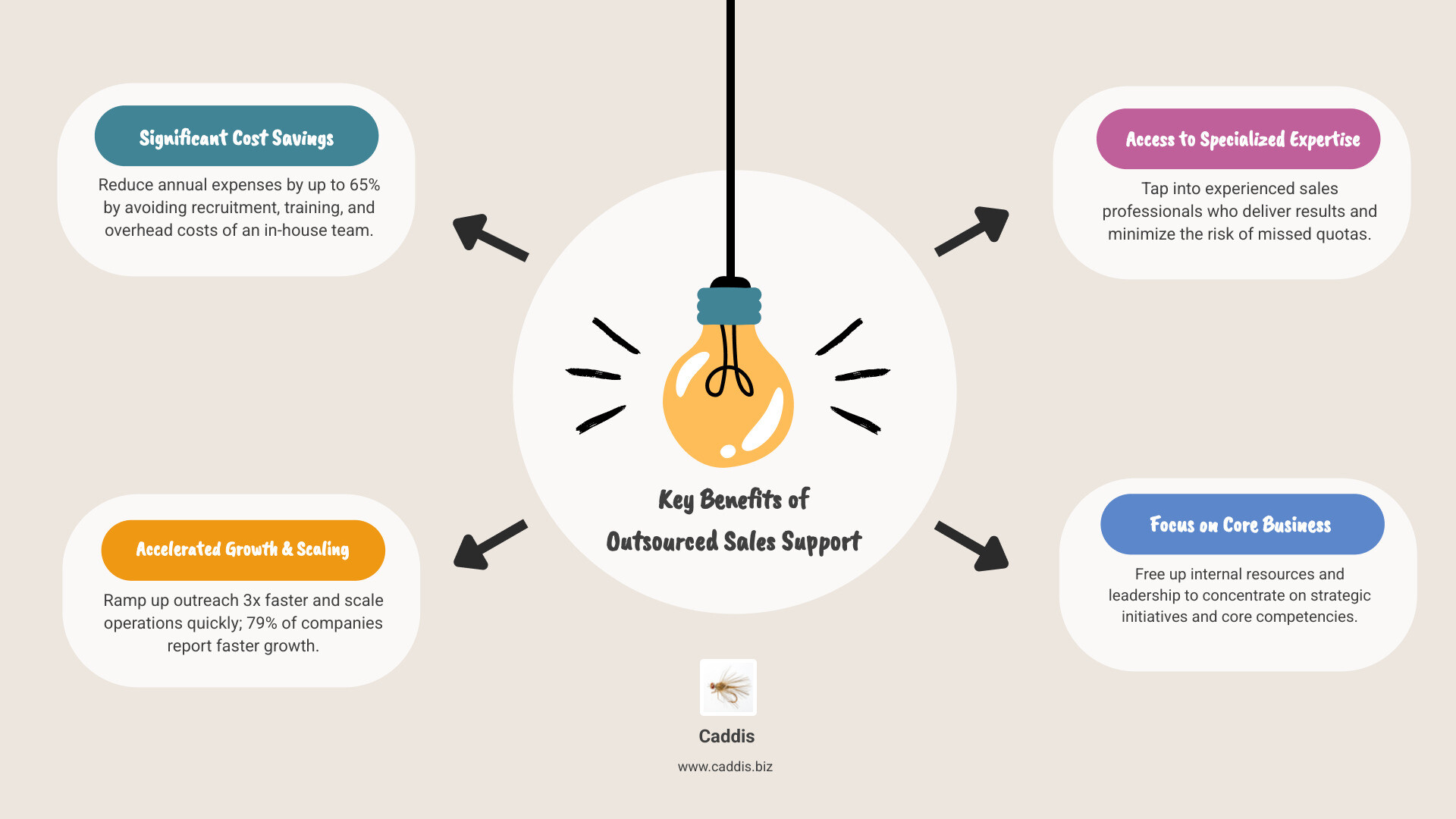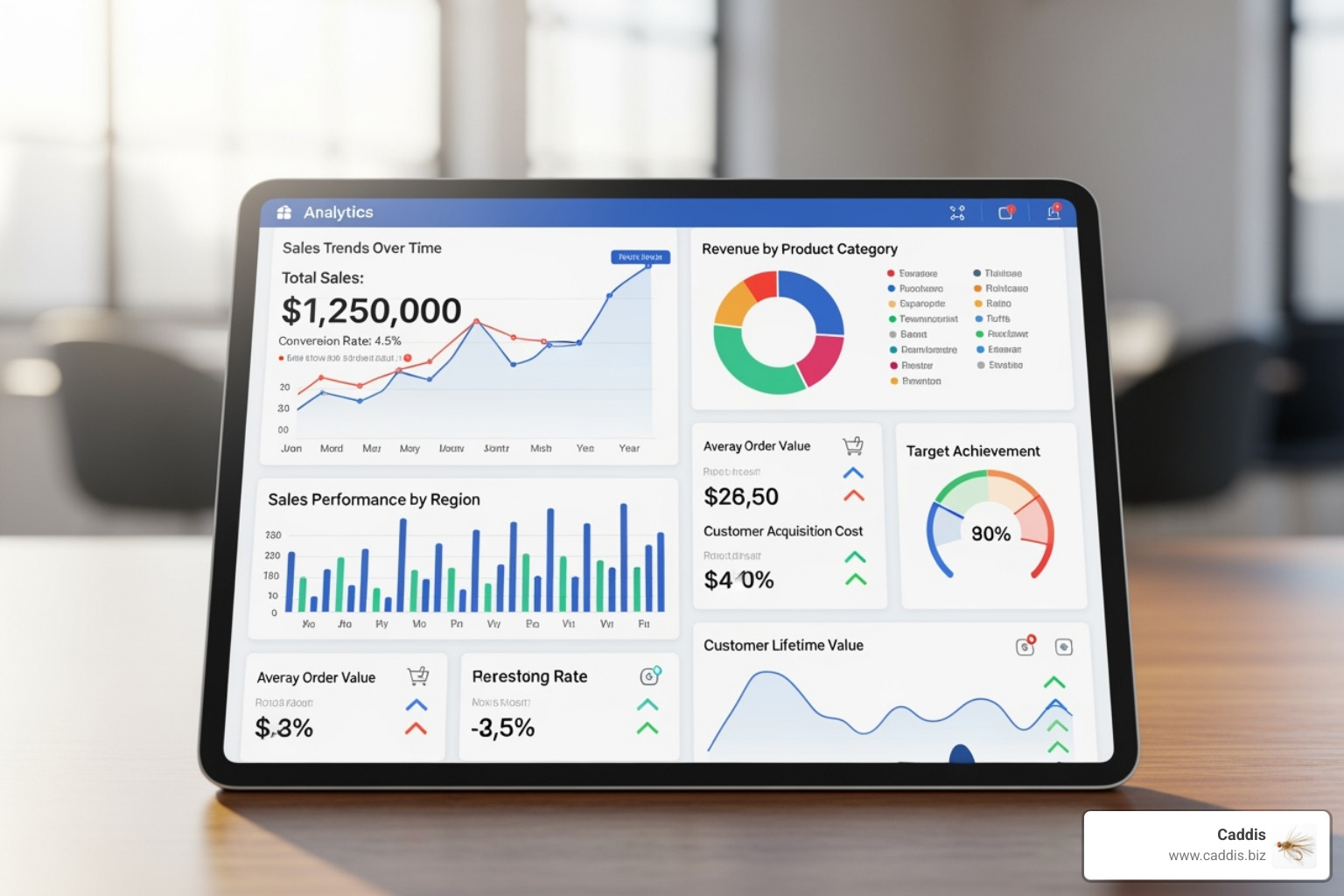Why Growing Businesses Turn to Outsourced Sales Support
Outsourced sales support has become a game-changer for companies looking to scale without the overhead of building an internal sales team. This approach involves partnering with external specialists to handle parts of your sales process, from lead generation to closing deals.
Key outsourced sales support options include:
- Inside Sales Teams: Remote professionals who nurture leads and close deals.
- Outside Sales Representatives: Field salespeople for face-to-face meetings.
- Lead Generation Services: Specialists who find and qualify potential customers.
- Appointment Setting: Teams focused on booking meetings with qualified leads.
- Full-Cycle Sales Support: End-to-end management of the entire sales process.
- Sales as a Service (SaaS): Long-term partnerships with dedicated sales teams.
The numbers tell a compelling story. Companies that outsource sales ramp up their outreach 3x faster and can save up to 65% annually on expenses. Of businesses using sales outsourcing, 79% report being able to scale faster as a result.
The appeal is clear: instead of spending months recruiting and training staff, businesses can tap into experienced professionals who deliver results. This is especially valuable when 37% of traditional sales reps fail to make their quotas—a risk that experienced outsourcing partners help minimize.
I’m Jeff Mount. I’ve spent years helping financial advisors and small business owners implement sales solutions that drive growth. I’ve seen how the right outsourced sales support partnership can transform a company’s revenue and free up leadership to focus on their core business.

Quick outsourced sales support definitions:
Understanding the Landscape of Sales Outsourcing
Think of outsourced sales support as an extension of your business. Instead of spending months hiring and training, you partner with professionals ready to generate results.
At its core, sales outsourcing means delegating sales functions to a third-party organization. For B2B companies, this creates powerful strategic partnerships. The outsourced team dives deep into your target markets and value proposition, becoming your sales experts without being on your payroll.
The sales outsourcing market is growing at a 9.4% annual rate through 2030, an explosive expansion driven by businesses recognizing its value. What’s driving this boom? 62% of companies seek access to specialized talent and the flexibility to scale resources as needed, avoiding the constraints of a fixed headcount.
This approach is often called “Sales as a Service,” emphasizing a long-term partnership model. You can dive deeper into this concept through Sales as a Service: The Benefits of Outsourced Sales.
At Caddis, we see this with financial advisors and small businesses who want to expand into new territories or launch products without building an entire sales department from scratch.
What are the different models of outsourced sales support?
The beauty of outsourced sales support lies in its flexibility. There’s a model to fit nearly any business challenge.
- Inside sales teams work remotely via phone, email, and video. With each contact costing $25-$30 versus $300-$500 for field sales, inside sales offers significant cost savings.
- Outside sales representatives meet prospects face-to-face. While more expensive, it’s invaluable for complex sales that require in-person trust.
- Appointment setting services focus solely on booking meetings for your internal team, freeing your reps to sell rather than prospect.
- Lead generation services identify and qualify potential customers, keeping your sales pipeline full.
- Full-cycle sales manages everything from prospecting to closing deals. It’s like having a complete, off-site sales department.
- Channel sales involves managing partners like resellers and distributors who sell your products.
The key is matching your needs with the right model. More details can be found in our outsourced sales development guide.
Types of Outsourced Sales Services
Beyond core models, specialized services tackle specific revenue generation challenges.
- Account-Based Marketing (ABM) creates highly personalized campaigns for strategic, high-value accounts, often yielding higher conversion rates.
- B2B email marketing agencies craft sophisticated campaigns for lead nurturing and conversion, focusing on deliverability and compelling content.
- Demand generation creates widespread interest for your products through content marketing, digital ads, and strategic outreach to drive inbound leads.
- Modern outbound call centers handle cold calling, lead qualification, and appointment setting. The approach works, as 78% of decision-makers have taken appointments that originated from emails or cold calls.
Several reputable companies specialize in these areas. Belkins and Cience are well-known for lead generation, while SalesRoads offers broader outsourced sales solutions.

The Business Case: Why Companies Outsource Sales
The decision to use outsourced sales support is a strategic pivot that transforms business growth and competitiveness. When running a financial advisory practice or a small business, your expertise lies in serving clients. Sales is a different discipline requiring specialized skills and time.
By partnering with external sales professionals, you free up your internal team to focus on core business functions. Your advisors can spend more time with clients, and your product team can innovate. It’s about playing to your strengths.

The speed to market advantage is game-changing. Building an internal sales team is slow. With outsourced sales support, you can deploy a trained team in weeks, ramping up outreach 3x faster. This is critical when launching a new service or expanding into a new territory.
The expertise access factor is equally compelling. Top-tier sales outsourcing firms employ seasoned professionals with proven strategies. When customer journey data aligns with sales processes, win rates can jump by 12%—the kind of expertise you get from specialists.
For both small business benefits and enterprise advantages, the goal is market share growth. External sales teams help you reach further and faster. The numbers back this up: 79% of companies using sales outsourcing report being able to scale faster, grabbing more market share while competitors are still hiring.
In-House vs. Outsourced Sales: A Cost and Efficiency Breakdown
The choice between an internal team and outsourced sales support often comes down to math. The numbers may surprise you.
| Feature | In-House Sales Team | Outsourced Sales Team |
|---|---|---|
| Cost | High. Includes salaries, benefits, training, office space, technology licenses, management oversight. | Lower. Often a monthly fee plus commission. No direct payroll, benefits, or overhead. Companies save an average of $92,180 a year. |
| Ramp-up Time | Long. Recruitment, onboarding, training can take months. | Short. Teams can be deployed in weeks or even days, as they are already trained and equipped. |
| Expertise | Built internally over time. May be limited by internal talent pool. | Access to specialized, experienced professionals across various industries and sales methodologies. |
| Scalability | Slow and rigid. Difficult to quickly scale up or down based on market demand. | Agile and flexible. Easily scale sales efforts up or down to match business needs or market fluctuations. |
Consider the salary costs of an in-house rep: base pay, commission, benefits, and overhead. Add training expenses ($10k-$15k per rep) and technology stack costs ($500-$1,000 per rep monthly for a CRM, automation tools, etc.). These expenses add up quickly, which is why 59% of companies outsource to cut costs. Companies can save up to 65% annually on sales expenses through outsourcing, averaging $92,180 per year. That’s capital you can reinvest in growth.
Efficiency gains are just as impressive. Outsourced teams focus on revenue-generating activities while their support infrastructure handles administrative tasks, flipping the script on the 30-50% of time internal reps spend on non-selling activities.
How Outsourcing Accelerates Growth and Market Entry
Outsourcing sales is like adding a rocket booster to your revenue engine. When expanding beyond your current reach, an outsourced team is your secret weapon.

Lead generation improvement is almost immediate. Specialist teams use proven tools and processes to keep your pipeline full of high-quality leads. This leads to shorter sales cycles, as your closers can focus on what they do best: closing deals.
Higher conversion rates come from this specialization. Aligning customer journey data with sales processes can lead to 12% higher win rates. It’s the result of data-driven specialists moving prospects through your funnel.
Outsourcing also lets you tap into untapped markets without the massive investment of opening new offices. You can leverage local knowledge and regional connections that would take years to develop internally. It transforms market expansion from a resource-intensive gamble into a manageable, cost-effective growth strategy. This is why 79% of companies using sales outsourcing report faster scaling—they grow smarter, with less risk and more agility.
The Implementation Playbook: How to Successfully Outsource Sales
Implementing outsourced sales support is about creating a strategic partnership that feels like an extension of your own team. The journey starts with identifying your sales pain points, like lead generation bottlenecks or administrative overload.
Once you know your challenges, goal setting becomes your North Star. Are you aiming to double qualified leads, enter a new market, or free up your internal team? These objectives will guide every decision.
The partnership selection phase is critical. This isn’t a vendor relationship; it’s a business partnership. Contract negotiation should be collaborative, with both sides working toward shared success metrics.
During the onboarding process, your chosen team must learn not just what you sell, but why customers should care. They need to grasp your company’s personality and ideal customer profile. This intensive training determines whether they will sound like authentic extensions of your business.
For businesses refining their approach, our Sales Strategy for Consulting Business guide offers insights into building frameworks that work with outsourced teams.
Key Factors for Choosing the Right Sales Outsourcing Partner
Choosing an outsourced sales support partner requires care. The best results don’t always come from the flashiest presentations.
- Industry specialization is crucial. A team that understands your market’s nuances can be effective immediately.
- Proven track records tell the real story. Go beyond promises by checking online reviews and demanding detailed case studies with specific metrics.
- Scalability is key for growth. Your partner should be able to scale efforts up or down to match market conditions without contractual headaches.
- The technology stack reveals sophistication. Look for partners using CRM integration, sales automation, and analytics tools that provide transparent reporting.
- Cultural alignment is often overlooked. If your company values a consultative approach, a partner focused on high-volume tactics will create brand confusion. The best partnerships feel seamless to your prospects.
Our work on Consultative Sales Strategy explores how to transform outsourced arrangements into strategic partnerships.
Managing the Relationship and Ensuring Brand Alignment
Once you’ve chosen your outsourced sales support partner, the real relationship work begins. This team represents your brand to new prospects.
Clear communication channels are the foundation. Flawless communication is critical, so establish weekly check-ins to share market feedback, adjust messaging, and solve small issues before they grow.
Regular feedback keeps everyone aligned. This two-way loop helps replicate successes and learn from challenges, changing good partnerships into great ones.
Integrating company culture requires intentional effort. Share your company’s story and core values to help the outsourced team represent your brand authentically.
Brand representation is paramount. Your outsourced team must grasp your unique value proposition well enough to communicate it naturally, not from a script. The most successful partnerships treat outsourced teams as extensions of the internal organization, not external vendors.
Our Sales Performance Improvement Program at Caddis incorporates these principles to help businesses maximize their partnerships.

Measuring Success and Navigating the Future of Sales
Once your outsourced sales support team is active, you need data to prove your investment is paying off. A professional sales partner should be as invested in proving their value as you are in seeing results.
Data analytics is your best friend. Modern outsourced sales support providers use sophisticated tracking tools to show what’s happening at every stage of the sales funnel. This information is the foundation for making smart strategic decisions.
The key is creating a feedback loop for constant learning and optimization. With real-time performance data, you can spot trends, double down on what works, and pivot away from strategies that aren’t delivering.

How to Measure the ROI of your outsourced sales support
Calculating ROI for outsourced sales support goes beyond revenue. You need to see the full impact on your business.
- Customer Acquisition Cost (CAC): Track how much you spend to acquire each new customer. Compare this to your previous CAC to see the savings, which average $92,180 annually for companies that outsource.
- Customer Lifetime Value (LTV): A good partner focuses on closing the right deals, which should lead to more valuable long-term customer relationships.
- Sales cycle length: Efficient lead qualification should result in deals closing faster, which improves cash flow.
- Conversion rates: Track percentages at each funnel stage. These are often the first indicators of success or areas needing attention.
- Pipeline value: A healthy, growing pipeline is a strong predictor of future revenue.
At Caddis, we emphasize KPI Tracking for Small Business because data-driven decisions are powerful. The best partnerships involve shared dashboards for real-time performance tracking. Using tools for tracking performance effectively should be part of your regular business rhythm.
Mitigating Pitfalls and Embracing Future Trends
Even the best outsourced sales support partnerships can face challenges. Knowing what to watch for is key.
Common pitfalls include:
- Unclear objectives: Vague goals like “more sales” are not enough. You need specific, measurable targets.
- Poor communication: Gaps between internal and external teams lead to missed opportunities and frustration. Establish regular check-ins and free-flowing information.
- Brand misalignment: If the outsourced team doesn’t understand your brand’s voice, prospects will notice something feels “off.”
These challenges are preventable with clear expectations, proper onboarding, and open dialogue.
Looking ahead, the outsourced sales support landscape is evolving. AI and automation are helping teams identify better prospects and personalize outreach. Hyper-specialization is another trend, with providers focusing on specific industries or sales stages for better results.
The market is predicted to grow at a 9.4% CAGR through 2030, reflecting the strategic value businesses find in these partnerships. The companies that thrive will view outsourced sales as a strategic capability to be scaled and optimized.
Frequently Asked Questions about Outsourced Sales Support
When considering outsourced sales support, many business owners have the same questions. Here are the concerns I hear most often.
Why do companies outsource their sales?
Companies typically outsource sales for four reasons: cost reduction, expertise access, speed, and focus. The numbers are compelling, with average savings of $92,180 a year compared to building an internal team. Outsourcing provides immediate access to specialized talent that may be difficult or expensive to hire directly. An outsourced team can start generating leads in weeks, not months, allowing your core staff to focus on what they do best, such as product development and customer service.
What are the potential risks of outsourcing sales?
Yes, there are risks, but they are manageable. The biggest concerns are a loss of control over customer interactions and ensuring brand alignment. If an outsourced team doesn’t understand your company’s voice, they can misrepresent your brand. Communication gaps can also derail partnerships. To mitigate these risks, choose a partner with a proven track record in your industry, establish clear communication channels from day one, and explicitly define your brand values. Starting with a smaller pilot project is a great way to build trust.
How much does it cost to outsource sales?
There is no single answer, as outsourced sales support pricing varies based on your needs. Models range from monthly retainers ($3,000 to $15,000+) to commission-based structures (10% to 20% of closed deals). Many successful partnerships use a hybrid model with a base fee and performance incentives. The complexity of your sales cycle and geographic scope also affect pricing. Instead of focusing only on the upfront cost, consider the total cost of ownership. Factoring in savings on salaries, benefits, and technology, outsourcing often delivers superior value.
Propel Your Growth with Strategic Sales Support
Adopting outsourced sales support is more than a cost-cutting measure; it’s a strategy to open up growth potential that might otherwise lie dormant. For financial advisors and small business owners, time spent prospecting is time not spent serving clients.
Outsourced sales support changes that equation. A strategic partnership with the right provider becomes an extension of your vision. They handle the heavy lifting of lead generation and appointment setting, while you focus on closing deals and serving clients. This isn’t just theoretical—we’ve seen companies save an average of $92,180 annually while scaling their outreach 3x faster.
For small businesses, the impact on business valuation can be transformative. A consistent, scalable revenue stream without the high overhead of an internal sales team demonstrates a lean, efficient operation to potential investors or buyers.
The beauty of this approach is its flexibility. You can scale up for opportunities and adjust to market shifts without the fixed costs of traditional hiring.
At Caddis, we’ve built our SalesQB framework to integrate seamlessly with outsourced sales partners, creating a system that drives measurable results. We know that combining strategic sales leadership with specialized external execution creates a powerful growth engine.
The future belongs to businesses that are agile and focused. Outsourced sales support isn’t just a tactical decision—it’s a strategic advantage that can define your company’s growth for years to come.
Ready to explore how strategic sales support can transform your business? Learn more about our Fractional Chief Revenue Officer services and find out how we can help you build the revenue engine your business deserves.


